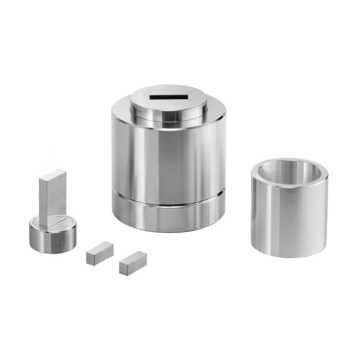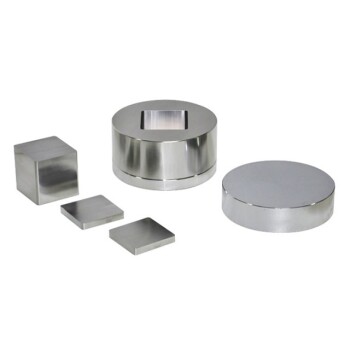At its core, the hydraulic cylinder is the heart of a laboratory press, responsible for converting fluid pressure into the immense mechanical force required for sample preparation and material testing. It uses a contained fluid, typically oil, to multiply a small input force into a powerful, uniform pressure that is applied to the sample.
The true role of the hydraulic cylinder is not just to generate force, but to deliver it with exceptional precision and uniformity. This control is what ensures the creation of consistent, high-quality samples and the accuracy of material strength tests in a laboratory setting.

The Core Principle: Translating Fluid to Force
A hydraulic cylinder's function is elegantly simple, relying on a fundamental law of physics to achieve its power. This mechanism is what makes the hydraulic press an indispensable tool in the modern lab.
Harnessing Pascal's Law
The entire system operates on Pascal's law, which states that pressure applied to a confined fluid is transmitted undiminished to every portion of the fluid and the walls of the containing vessel.
A pump applies pressure to hydraulic oil in a narrow cylinder, and that pressure is transferred to a much wider cylinder containing a large piston. This difference in surface area multiplies the initial force significantly.
The Piston and Fluid Mechanism
Inside the main hydraulic cylinder is a piston. When the pressurized fluid is pumped into the cylinder, it pushes against the face of this piston.
The piston's movement generates the powerful, linear mechanical force that drives the platen of the press downwards, compacting the material or sample held within a die.
Ensuring Uniform Pressure
Because the fluid transmits pressure equally in all directions, the force exerted by the piston is incredibly uniform across the entire sample surface.
This uniformity is critical for preventing defects such as air bubbles, internal fractures, or an inconsistent density, which would compromise the quality of the sample for analysis.
Why Hydraulics are Essential for Laboratory Applications
While other methods can generate force, a hydraulic system offers a unique combination of power, precision, and control that is perfectly suited for sensitive laboratory work.
Precision and Force Control
Hydraulic systems allow for the quick and easy adjustment of the applied force. This high degree of control is essential for repeatable experiments.
Whether you are gently compacting a delicate powder or testing the failure point of a material, the press can be dialed in to deliver the exact pressure required.
High Force from a Compact Design
The force-multiplying effect of hydraulics means a relatively small, energy-efficient machine can generate tons of pressure.
This makes it possible to crush, compact, or test very hard materials in a standard laboratory environment without needing massive, power-hungry equipment.
Key Applications in the Lab
The cylinder's force is harnessed for several primary tasks. It is used in sample preparation to create compact pellets from powders (like KBr for infrared spectroscopy) or to press biological materials for compound extraction.
It is also central to material testing, where it applies a controlled load to a sample to measure its compressive strength and durability.
Key Advantages and Operational Benefits
The choice of a hydraulic press in a laboratory is driven by a clear set of advantages that impact efficiency, cost, and safety.
Advantage: Efficiency and Versatility
A hydraulic press produces immense pressure with a relatively small energy input, making it an energy-efficient choice. Its ability to handle a wide range of pressures and sample types makes it a highly versatile instrument for diverse research needs.
Advantage: Safety and Reliability
These systems are designed with safety in mind, often including features that prevent overloading and protect the operator. Furthermore, they require minimal maintenance, making them a reliable and cost-effective long-term investment for any lab.
Making the Right Choice for Your Goal
Understanding the hydraulic cylinder's function helps you leverage the press for superior results.
- If your primary focus is sample preparation (e.g., KBr pellets): The cylinder's ability to apply uniform pressure is essential for creating clear, homogenous pellets free of cracks or cloudy areas.
- If your primary focus is material testing: The cylinder's precise force control and high-pressure capability are what allow you to obtain accurate and repeatable data on material strength.
- If your primary focus is operational efficiency: The hydraulic system offers a safe, low-maintenance, and energy-efficient method for achieving the high forces your research demands.
Mastering your hydraulic press begins with recognizing the cylinder as the source of its controlled and powerful force.
Summary Table:
| Aspect | Role in Lab Press |
|---|---|
| Force Generation | Converts fluid pressure into mechanical force using Pascal's Law. |
| Precision Control | Allows easy adjustment of force for repeatable experiments. |
| Uniform Pressure | Ensures even force distribution to prevent sample defects. |
| Applications | Used in sample preparation (e.g., KBr pellets) and material testing. |
| Advantages | Energy-efficient, safe, reliable, and versatile for various lab needs. |
Ready to enhance your laboratory's capabilities with reliable hydraulic presses? KINTEK specializes in high-performance lab press machines, including automatic, isostatic, and heated lab presses, designed to deliver precise force control and uniform pressure for superior sample preparation and material testing. Whether you're creating KBr pellets or conducting strength tests, our equipment ensures accuracy, efficiency, and safety. Contact us today to discuss how KINTEK can meet your specific lab needs and boost your research outcomes!
Visual Guide

Related Products
- Automatic Laboratory Hydraulic Press Lab Pellet Press Machine
- Manual Laboratory Hydraulic Press Lab Pellet Press
- Laboratory Hydraulic Press 2T Lab Pellet Press for KBR FTIR
- Automatic Laboratory Hydraulic Press for XRF and KBR Pellet Pressing
- Laboratory Hydraulic Press Lab Pellet Press Button Battery Press
People Also Ask
- How do hydraulic pellet presses contribute to material testing and research? Unlock Precision in Sample Prep and Simulation
- What are the limitations of hand-operated presses? Avoid Sample Compromise in Your Lab
- What are the advantages of using a hydraulic press for pellet production? Achieve Consistent, High-Quality Samples
- How does a hydraulic press aid in XRF spectroscopy? Achieve Accurate Elemental Analysis with Reliable Sample Prep
- What feature of the hydraulic portable press helps monitor the pellet-making process? Discover the Key to Precise Sample Preparation



















